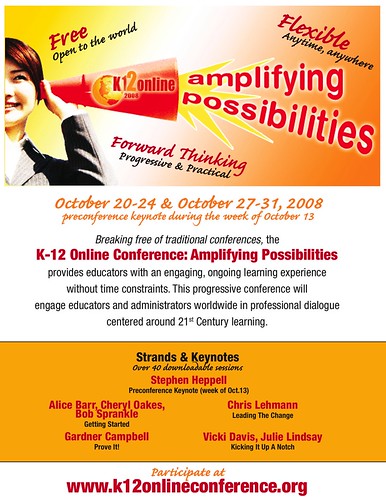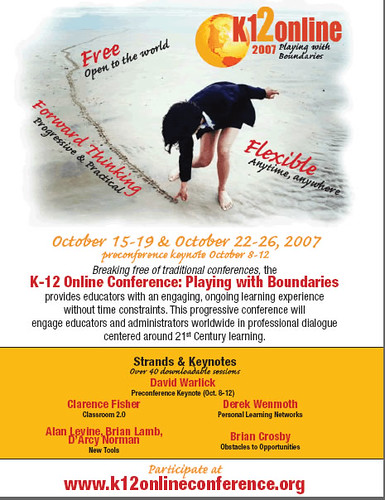PC World has released an instantly popular list of the “10 Worst Consumer Tech Trends“. As soon as I read the list, it was easy to see the parallels in education. Thus, here’s my educational take on the list.
10. Closed Source Technology – I’ve been an advocate of FLOSS for quite a few years now, in fact, my dissertation had much to say about the topic. While we are nowhere near a world where Linux is ubiquitous, we’ve made a lot of progress through Firefox, Open Office and newer software like Google Android for mobile devices. In my courses, I make use of our Windows and Mac machines, but introduce many open source apps on the desktop. As well, Linux Live CD’s are used often to get beyond the tyranny of the desktop.
While we have a long way to go, my best indication of how far we’ve come is that the terms “open source” and “free software” (not simply a the “free in beer” sense) have become much more common in conversations with my non-techy students and colleagues. I think there are many experiencing a mental shift, however, we need to catch up through user interface and viral marketing approaches.
9. Over-promising and under-delivering: I’m still convinced that salesmen do more educational technology planning than educational administrators. I know of institutions locked-in to student administration systems like SCT Banner for periods of more than 10 years when (I’ve been told) there are other open source solutions available. I hear nothing but complaints from institutional users of Blackboard, people who’d rather learn Moodle on their own than go with the supported, Blackboard “solution”. IBM Learning Village is a common “instructional portal” in many school districts, one that has been abandoned by many teachers in favour of flexible, free environments, services like Ning.
And while we’re talking “over-promising, under-delivering” we can go beyond the issue of proprietary software. Larger, conceptual frameworks like course/student/learning management systems or just about any monolithic learning “solution” (or learning theory for that matter) can be critiqued in a similar manner.
8. Fanboys: “The definition of fanboy (or fangirl) is an individual who harbours a fanatic devotion to something without logical reason.” While at times I might be considered an Apple fanboy, I’d argue that I’m promoting a particular concept more than an specific product. I wrote a while back re: the Apple iTouch and the potential implications for learning. And while I love my iTouch, I was more critical to the fact that I needed to Jailbreak it before it actually became a usable, personal learning device.
And in relation to this point, I’m witnessing a disturbing trend in some parts of the edublogosphere as of late. I’ve ditched several, (once) trusted blogs from my reader in the past few weeks due to their less-than-critical, over-promoting of certain Web 2.0 tools and services. Note to those (few) edubloggers: if you’re on the take, your readers deserve full disclosure.
7. Region-encoding: I couldn’t think of how this applied to education in any significant way. Any ideas?
6. Licensing fees: Put simply, I do everything I can to avoid any content or products where licensing is required. I promote freely available media through such sources as the Creative Commons and Archive.org. As well, I nurture a learning environment where learners become producers nearly as much as they are consumers. At the same time, I do recommend exemplary copyrighted works, and do understand this livelihood model. However, the bar has been raised in relation to what I will spend money on. In this abundance economy, I need a strong demonstration of “value-added” before I ever consider pulling out my credit card.
5. Format wars: I haven’t much to say on this topic other than getting into a rant on the Open Document Format, and others have said it better. Anyone?
4. Proprietary file formats: Most proprietary products produce proprietary formats out of the box. Whether it’s a .doc, AAC or even .mp3, these formats can cause a huge issue, proprietary file format lock-in.
3. Annoying web ads: I won’t get into a rant against web-advertising. I am one of those people that pays to make my learning environments ad-free. For instance, I pay about $20/month to turn the ads off in my Ning groups, and I pay a smaller fee for my Wikispaces pages. For those in K-12, it’s great that you can turn off the ads in both of these services for free.
2. High cost of wireless data plans: It’s remarkable how many of my students have mobile phones. Even when I visit K-12 classrooms, the number of cell phones is high. For now, I can only dream of the possibilities for mobile learning. Our data plans in Saskatchewan and throughout Canada are simply too expensive to do anything creative. And beyond that, we’re not even at 3G yet. Maybe someday.
1. DRM: If DRM has done anything for our education system, it’s helped to nurture authentic, problem-based learning activities in our hacking communities. DRM does not work. It will never work. The system has to change. We are now seeing the power of an emerging, decentralized era. See Radiohead and Nine Inch Nails.
That’s it. Would love to hear your thoughts.



